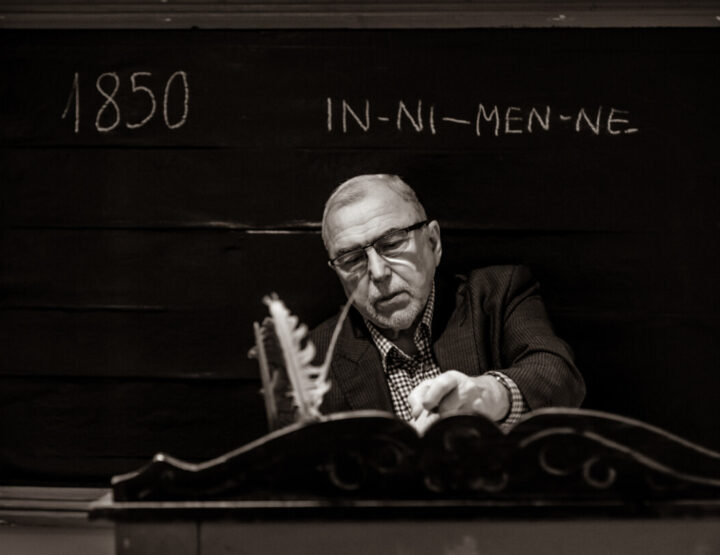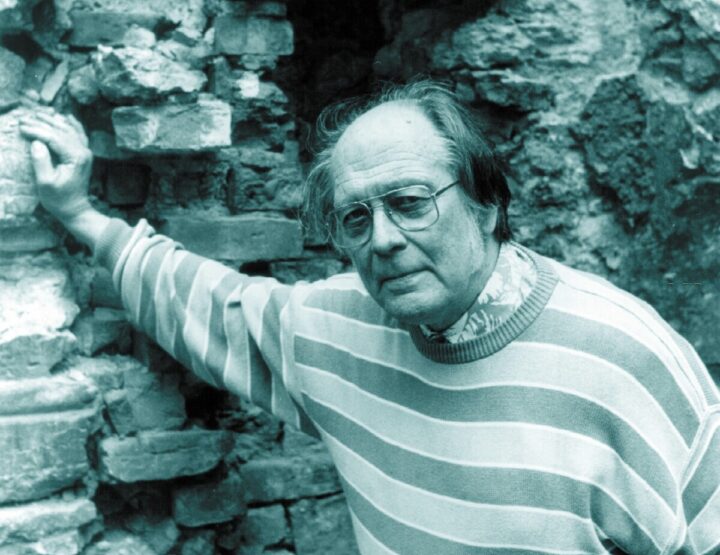Jaan Kross’ 1998 novel Paigallend will soon be appearing in English under the title of Treading Air which is an approximation to the original hovering name for the book, and an analogy to treading water an activity which keeps your head above the surface when you’ve fallen in.
Ullo Paerand, the protagonist of the novel, has certainly fallen into a life he did not plan for himself and spends the whole novel trying to keep his head above water.
The novel is linked to Kross’ previous novel Wikmani poisid (The Wikman Boys) of a decade previously by this character Ullo, who is only mentioned in passing in the former novel. But now, as Kross says in the first paragraph, he feels he needs to devote a whole novel to Ullo, as he feels he deserves it.
Where the former novel deals with the lives of several former pupils of the Wikman Boys’ Grammar School, here we are only dealing with one. And the tales are related to the reader via Kross’ alter ego Jaak Sirkel, who gives the novel narrative structure. In the 1980s, Ullo agrees to tell episodes of his life to this old friend from Wikman’s, though several years his junior. But Ullo is not a great teller of stories and thus the whole book is episodic rather than flowing narrative.
Ullo Paerand was born Ulrich Berends in a well to do middle class Estonian family, and the first years of his life are idyllic. His father has enough money to take his mother, Ullo and the maid on trips abroad, not least to the Berlin of the 1920s where, owing to inflation, everything is incredibly cheap for anyone changing their currency for the failing Deutschmark of the time. He is very much the pampered only child.
But things soon begin to go wrong. As business becomes tough, the Berends family have to move into progressively cheaper and less luxurious accommodation. And finally, the ultimate blow comes to the tranquil life Ullo has enjoyed when his father, who turns out to have been a property speculator, moves to Holland or Belgium with his mistress, leaving behind Ullo and his mother in straitened circumstances.
Ullo and his mother change their surname to Paerand in a mixture of following the trend for the Estification of surnames during the 1930s and in an attempt to shrug off the stigma attached to their former surname. Ullo’s mother takes jobs which, formerly would have been far below her station, e.g. working in a market garden. Then, a little later, Ullo and his mother even start a laundry to make ends meet.
But Ullo is a hyper intelligent lad, as the narrator had already understood while the two of them were still at the Wikman school. After a spell at the Sports Encyclopaedia as general dogsbody, he obtains a temporary job at the Electoral Commission distributing the paperwork and documentation for the forthcoming election. One thing leads to another and he, along with one other young man, is kept on after the election in the capacity of errand boy for, ultimately, the prime minister of the day.
The style and pace of the novel are, by now, clear to the reader. National tragedy is interwoven with personal fortunes. Kross intersperses episodes and anecdotes about the life of Ullo Paerand with hints, allusions and sometimes descriptions of the political and social life of Estonia as it sinks, in the late 1930s, into war and chaos after the desperate attempts by the autocratic head of government, Konstantin Päts, to stabilise the country after the Wall Street Crash, which brought as much misery to Estonia as it did to countries throughout the world. Because Ullo is in the right (?) place at the right time he sees with his own eyes one of the most humiliating episodes in Estonian history, when in 1940 the Soviet Union, having bullied Estonia into accepting troops, purportedly to guard it from the Nazis, drives unapposed thousands of men in lorries and tanks across the border with the Soviet Union, then to the east of Narva, thus starting what is in effect an invasion of the country. Ullo’s presence is on account of his job, given him by the prime minister of the time, to check on the number and type of Soviet vehicles entering Estonia.
Somehow, Ullo, almost naļve with regard to politics, manages to quietly retain his job as prime minister’s errand boy during the career of three prime ministers: the last one of the Estonian Republic, the one during the first Soviet occupation of Estonia (1940-1941) and during the time of the German occupation (1941-1944). This, of course, gives the author ample opportunity to relate a good many small, amusing episodes.
But tragedy begins to take the upper hand as, in 1944 like thousands of Estonians, Ullo and his wife decide to flee the country by one of the small boats leaving from the west coast. But at the last minute they decide not to leave their native land after all, but to try their luck by staying put.
Ullo and his wife experience the devastating bombing of Tallinn on 9th May 1944 by Soviet women (!) pilots led by a Canadian Communist when, instead of bombing the harbour to put the shipping lanes out of action, the bombers target the centre of the city, causing a great deal of damage, the results of which are commemorated to this day on Harju Street by a plaque set in a small area of waste ground where the Hotel Grand once stood.
The highly intelligent and well educated Ullo ends up working in Tallinn in a suitcase factory, building suitcases: covering plywood frames and then spraying them in the paint shop. (This fate is, ironically, not unlike that of thousands of exiled Estonians who ended up doing physical work in exile when in Estonia they had been university educated and would perhaps have become civil servants.) Then, as the paint begins to affect his lungs, he takes on the job of warehouse keeper.
Ultimately, the narrator rather loses touch with Ullo and his wife, and this state of affairs lasts for many years until Ullo agrees to tell the story of his life to the narrator during several sittings. But this series of interviews is never completed as Ullo suddenly phones up the narrator from the Seewald Mental Hospital (nowadays called “Merimetsa” which means the same thing Sea Forest) where he has ended up as the result of a nervous breakdown. Ullo has decided to go on hunger strike…
These are but the bare bones of a book over 370 pages long and divided into 40 chapters and I have not described in detail some of the more amusing or moving episodes such as the description of the real life Communist prime minister of Estonia Johannes Vares-Barbarus, the encounter with a Catholic monsignore, the Tuglas episode, or the coda at the very end of the novel where Ullo finally meets his father again in a kind of reverie or daydream. But suffice it to say that the novel has enough stories, and stories within stories, to make it entertaining and educative about the 20th century fate of a country which, until 1991, had almost vanished from the consciousness of the average West European after decades of occupation.
***
© ELM no 16, spring 2003



